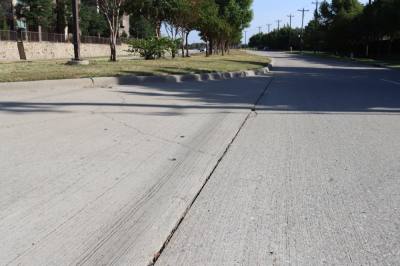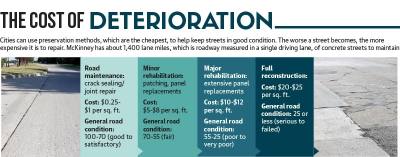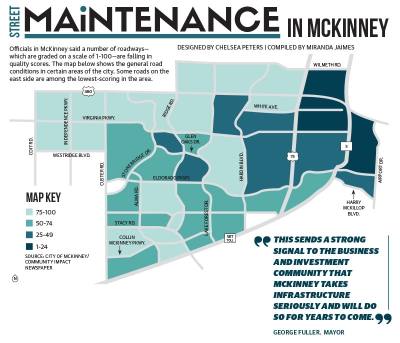As part of an effort to promote economic development through street improvements, the city of McKinney is taking what officials call a “creative,” “long-term approach” to managing roadways.
On June 21, City Council unanimously adopted a resolution to collaborate with the McKinney Economic Development Corp. and the McKinney Community Development Corp. to use the same types of funding as these entities for roadway improvements. The MEDC and the MCDC use Type A and Type B corporation sales tax revenues for promoting businesses and cultivating communities in McKinney.
Over the course of several meetings that began in 2020, the council and city staff collaborated on funding options to keep up with McKinney’s roadway deterioration.
By using the sales tax revenue funds, any future sales tax growth the city collects would be split between roadway investments, and the MEDC and the MCDC. City officials are conservatively estimating sales tax revenue would grow 5% each year. With this resolution, in 10 years, the city could theoretically have put $64.1 million toward roadway investments, according to meeting documents.
“With the rapid growth of our city and the need for expanded roadways, this commitment by MEDC and MCDC will greatly aid our effort to invest in our community’s future public infrastructure,” Mayor George Fuller said in a news release. “This will send a strong signal to the business and investment community that McKinney takes infrastructure seriously and will do so for years to come.”
Since 2002, the city has invested nearly $320 million in new road infrastructure and more than $112 million in roadway maintenance and reconstruction, according to the news release. This initiative creates a new funding mechanism to help offset those costs.
“We need good roads in order to have businesses come to McKinney and so that their customers can access those businesses,” City Manager Paul Grimes said.
Importance of roadways
The idea behind this initiative came about from a work session in the fall of 2021 where city staff evaluated the condition of the city’s existing roadways. These are declining, Grimes said, and the city needed to come up with a way to fund the maintenance of its roads.
At a Feb. 1 council work session, Ryan Gillingham, the city’s director of public works, noted the city’s pavement condition numerical scores, which show the general condition of McKinney’s roadways, have been falling in recent years. The 2021 score for McKinney was 71, with 100 being the best. The score from 2015 was 82.
“The rate of deterioration for McKinney’s roadways exceeds the rate of reinvestment,” he told council.
State law allows the city to use the sales tax revenue from the development corporations to fund new roadways, so long as they are advancing economic development, Grimes said. And the city has lots of these types of projects, he said.
For instance, as McKinney grows into the northwest sector, extensions to Wilmeth Road, Bloomingdale Road and Laud Howell Parkway will elevate these corridors to arterial roadways that will help stitch the community together, Grimes said.
“That’s the value of roadways,” he said. “Investors always look to your transportation infrastructure to say, ‘How are people going to get around in this community? Before we make an investment, we want to know that this community actually invests in their roadways.’”
MEDC Board President Michael Jones said not only will the roads attract new businesses, but it has the added benefit of improving the quality of life for existing McKinney residents, and economic development helps create “a vibrant community for our residents.”
MCDC Board Chair Angela Richardson-Woods agreed.
“Our roadways are the critical connectors for McKinney’s current and future businesses as well as their employees and customers,” Richardson-Woods said in the city news release.
While the funds from this initiative can only be used for selected new roadways, it frees up money from the city’s capital improvement budget to improve the city’s other existing corridors. That includes streets on the east side of the city or west of US 75 that are aging and need work, Grimes said. The pavement condition scores in these areas range anywhere from 10-54 on a scale of 100.
“Our engineering department and our public works department will work to prioritize those for roadway maintenance,” he said.
How it works
When people spend money, such as when dining or shopping in McKinney, it generates a half-cent sales tax revenue that goes specifically toward funding community projects and events or economic development. With the new resolution for roadway investments, any new sales tax above a certain threshold will be split three ways between community projects, economic development and maintaining roadways.
“One of the key pillars of economic development is infrastructure,” Grimes said. “You have to be able to get people to and from work, or customers need to be able to get to and from retail.”
Staff estimates that McKinney will receive about $40 million in total sales tax revenue during fiscal year 2021-22. That amount will be used as a baseline for future years. If in the next fiscal year that revenue grows to a total of $50 million in sales tax revenue, the extra $10 million would be split between the roadway investment fund and the two different development corps, Grimes said. In that situation, that would translate to $5 million going to roadway investments, and the remainder will go to the MCDC and the MEDC at $2.5 million apiece.
According to a news release, this initiative is expected to commit $150 million-$300 million to roadways through 2035.
Added benefitsThis investment fund means the burden of paying for improved streets does not fall only on McKinney residents, but rather on visitors who come to the city to eat or shop, Grimes said.
“People who pay sales taxes oftentimes ... don’t live in McKinney, but they come and use our restaurants, or they go to Costco or Target,” Grimes said. “We’re actually spreading the commitment to pay over a wider group of taxpayers.”
Several options were discussed to fund roadways, but using sales tax was a hybrid approach that marks a “significant policy shift,” Grimes said at the June 7 work session.
“That’s the benefit of public deliberation,” Grimes said. “This is why you have work sessions, and you work through these issues and you come up with a solution that works for everybody as much as possible.”








